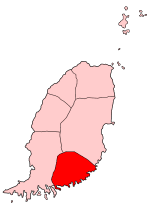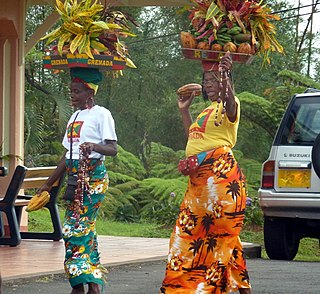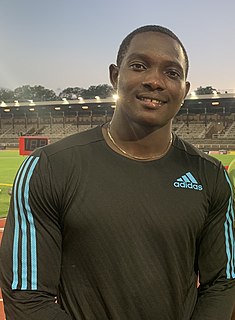Related Research Articles

The United States invasion of Grenada began at dawn on 25 October 1983. The United States and a coalition of six Caribbean nations invaded the island nation of Grenada, 100 miles (160 km) north of Venezuela. Codenamed Operation Urgent Fury by the U.S. military, it resulted in military occupation within a few days. It was triggered by the strife within the People's Revolutionary Government which resulted in the house arrest and execution of the previous leader and second Prime Minister of Grenada Maurice Bishop, and the establishment of the Revolutionary Military Council with Hudson Austin as Chairman. The invasion resulted in the appointment of an interim government, followed by elections in 1984.

The governor-general of Grenada is the vice-regal representative of the Grenadian monarch, currently Queen Elizabeth II, in Grenada. The governor-general is appointed by the monarch on the recommendation of the prime minister of Grenada. The functions of the governor-general include appointing ministers, judges, and ambassadors; giving royal assent to legislation passed by the Grenadian Parliament; and issuing writs for election.

The flag of Grenada consists of two yellow triangles at the top and bottom and two green triangles at the hoist and fly. These are surrounded by a red border charged with six five-pointed yellow stars – three at the top centre and three at the bottom centre – along with an additional star on a red disc at the centre and a nutmeg at the hoist triangle. Adopted in 1974 to replace the temporary design used since the islands became an Associated State of the United Kingdom, it has been the flag of Grenada since the country gained independence that year. The representation of a nutmeg is symbolic of the islands' primary export, and was the one feature from the previous flag that was preserved.

Saint David's Parish is the fourth largest of the parishes of Grenada in the island's southeast. The parish's main town is St. David's, located between La Tante and Westerhall. Because St David's is so small, the parish is sometimes referred to as "The Virgin Parish".

The British Windward Islands was an administrative grouping of British colonies in the Windward Islands of the West Indies, existing from 1833 until 31 December 1959 and consisting of the islands of Grenada, St Lucia, Saint Vincent, the Grenadines, Barbados, Tobago, and Dominica, previously included in the British Leeward Islands.

The Gazette of the United States was an early American newspaper, first issued semiweekly in New York on April 15, 1789, but moving the next year to Philadelphia when the nation's capital moved there the next year. It was friendly to the Federalist Party. Its founder, John Fenno, intended it to unify the country under its new government. As the leading Federalist newspaper of its time, it praised the Washington and Adams administrations and their policies. Its Federalist sponsors, chiefly Alexander Hamilton, granted it substantial funding; because some of it was directly from the government, the Gazette is considered to have been semi-official. The influence of the newspaper inspired the creation of the National Gazette and the Philadelphia Aurora, rival newspapers for the Democratic-Republicans.

The monarchy of Grenada is a system of government in which a hereditary monarch is the sovereign and head of state of Grenada. The present monarch is Elizabeth II, who is also Sovereign of a number of the other Commonwealth realms. The Queen's constitutional roles are mostly delegated to the Governor-General of Grenada. Royal succession is governed by the English Act of Settlement of 1701, which is part of constitutional law.

Grenada is an island country in the West Indies in the Caribbean Sea at the southern end of the Grenadines island chain. Grenada consists of the island of Grenada itself, two smaller islands, Carriacou and Petite Martinique, and several small islands which lie to the north of the main island and are a part of the Grenadines. It is located northwest of Trinidad and Tobago, northeast of Venezuela and southwest of Saint Vincent and the Grenadines. Its size is 348.5 square kilometres (134.6 sq mi), and it had an estimated population of 112,523 in July 2020. Its capital is St. George's. Grenada is also known as the "Island of Spice" due to its production of nutmeg and mace crops.

Afro-Grenadians or Black Grenadians are Grenadian people of largely African descent. This term is not generally recognised by Grenadians or indeed Caribbeans. They usually refer to themselves simply as Black or possibly Black Caribbean. The term was first coined by an African Americans history professor, John Henrik Clarke (1915–1998), in his piece entitled A Note on Racism in History. The term may also refer to a Grenadian of African ancestry. Social interpretations of race are mutable rather than deterministic and neither physical appearance nor ancestry are used straightforwardly to determine whether a person is considered a Black Grenadian. According to the 2012 Census, 82% of Grenada's population is Black, 13% is mixed European and black and 2% is of Indian origin.
Steve Mark was a Grenadian international footballer who played as a defender.

Grenadian nationality law is regulated by the 1973 Grenadian Constitution, as amended; the Citizenship Act of 1976, and its revisions; and various British Nationality laws. These laws determine who is, or is eligible to be, a national of Grenada. Grenadian nationality is typically obtained either on the principle of jus soli, i.e. by birth in Grenada; or under the rules of jus sanguinis, i.e. by birth abroad to parents with Grenadian nationality. It can also be granted to persons with an affiliation to the country, or to a permanent resident who has lived in the country for a given period of time through naturalisation. There is also, currently a program in Grenada for persons to acquire nationality through investment in the country. Nationality establishes one's international identity as a member of a sovereign nation. Though it is not synonymous with citizenship, for rights granted under domestic law for domestic purposes, the United Kingdom, and thus the Commonwealth, have traditionally used the words interchangeably.

Anderson Peters is a Grenadian javelin thrower and the current world champion in the event. He is a multiple time CARIFTA Games champion at the discipline and in 2016 earned a bronze medal at the 2016 IAAF World U20 Championships in Bydgoszcz, Poland, setting a new Grenadian national record and OECS record at the same time.

Gertrude Protain was a Vincentian/Grenadian educator, politician, and tourism expert, as well as one of the influential feminists working in the Caribbean in her era. She was the first woman to serve on the Legislative Council of Grenada and became the island's "First Lady of Tourism".

Grenada–Mexico relations refers to the diplomatic relations between Grenada and the United Mexican States. Both nations are members of the Association of Caribbean States, Organization of American States and the United Nations.

Snap general elections were held in Grenada on 23 June 2022. The incumbent Prime Minister Keith Mitchell sought a sixth term. National Democratic Congress (NDC) made a return to parliament after nine years of absence, defeating the ruling party New National Party (NNP), which led to Dickon Mitchell becoming the new prime minister of Grenada. This is also the first election since 2008 where the NDC gained seats.
References
- ↑ "The Barnacle News". Barnacle News. Retrieved March 6, 2020.
- 1 2 3 4 "List of Grenada Newspapers". Online Newspapers List. Archived from the original on March 2, 2020.
- ↑ "The Grenada Informer Newspaper" . Retrieved March 6, 2020.
- ↑ "E-paper Archives". Grenadian Voice. Retrieved May 26, 2021.
- ↑ "The New Today". The New Today. Retrieved March 6, 2020.
- ↑ "NOW Grenada". NOW Grenada. Retrieved March 6, 2020.
- 1 2 3 4 5 6 7 8 9 10 11 12 13 "The Grenada Revolution Online". The Grenada Revolution online. Retrieved March 3, 2020., historical newspapers
- 1 2 3 4 5 6 7 8 9 10 11 12 13 14 15 16 17 18 "Grenadian Genealogy". Grenadian Girl. Retrieved March 6, 2020., also available from the British Library "Grenada Newspapers". British Library. Retrieved March 6, 2020.
- ↑ "Grenada Old Newspapers, University of Illinois at Champaign-Urbana Library". Facebook. Retrieved March 3, 2020.
- "Grenada National Archives". Facebook. Retrieved March 3, 2020.
- "Newspapers at the National Archive". National Archives.gov.uk. Retrieved March 3, 2020.
- "National Archives of Grenada". Grenada National Archives. Retrieved March 3, 2020.
- "Search for Grenada Newspapers". National Archives. Retrieved March 3, 2020.